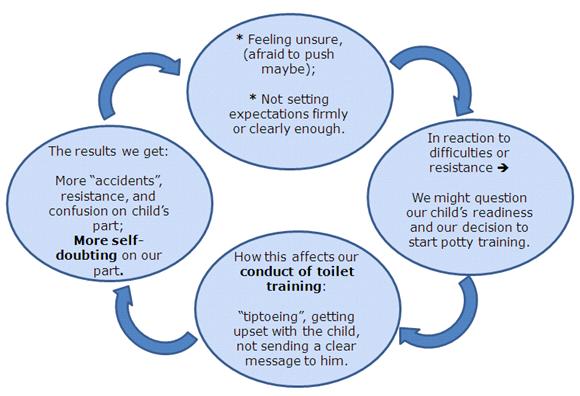Potty Training Parenting:
Simple Guidelines
to Brush Up Your Own Readiness
This Potty Training Parenting article is about helping parents with what I've experienced as the more important aspect of being ready for toilet training: our own readiness.
The common discussion of potty training readiness is referring to signs of readiness that we should look for in our child’s development and behavior.
I’m not against that, but let me tell you a little story:
When we were potty training our first boy, my husband and I went through a long phase of “one step forward, two steps back” – actually a few months of frustration, disappointment and pure suffering at times.
When we finally decided that enough was enough, we went to see a professional consultant who specialized in potty training. The guidance we got from her changed our way of thinking and made a lot of sense in the chaos.
We didn’t have to do much except for changing our state-of-mind. Everything else just fell into place.
I guess I’ve been very passionate since then about “potty training parenting” as you may put it. My view about toilet training readiness is, it’s completely in our (=parents) hands.
Most difficulties we may experience while training, are not associated with lack-of-readiness on our child's part, rather with how we conduct ourselves in the training process.
I've been trying to find some documented reference to back this up, and came across a Study that mentions a relation between difficult toilet training and ineffective interactions around issues of toileting. [Source: Alison Schonwald, Lon Sherritt, Ann Stadtler, and Carolyn Bridgemohan; Factors Associated With Difficult Toilet Training; Pediatrics, Jun 2004; 113: 1753 - 1757]
If toilet training becomes a struggle, is it possible that we are doing something wrong?
I think of it as a cycle that starts with the parent. I did my best to describe it in the sketch below: It is based widely on the events I had experienced personally; Also, from talking to other parents I feel that although this doesn’t happen to everyone -- it's not uncommon, either.
Potty training parenting - "self doubting cycle":

It’s easy to avoid it, if we put some attention on potty training parenting, starting with: getting ourselves ready for toilet training, mentally and emotionally.
Potty Training Parenting Guidelines
Here are a few simple guidelines for potty training parenting:
-
The main guideline, which also sets the tone for the rest, is to see ourselves as authoritative figures, capable of leading the potty training process for our little boys or girls. The children are not responsible for the process, we are. They don’t necessarily have to express interest in it. Toilet training can be treated as any other educational process, where if we feel it’s essential for our children -- we set the rules for them.
It's important though, not to confuse leading with pushing or forcing. You'd be doing it with empathy and love.
-
You’re ready for potty training when you have determined in your mind that your child should stop wearing diapers during the day (night potty training is a different story, as it involves physiological aspects that children are not conscious about. It can be handled separately from the educational process, and it doesn’t need to happen right from the start).
You want to be decisive about potty training and send a very clear message to your child about it. If you’re in it more for the test, as in “let’s try it for a little while and see what happens” –- children will get that message and sense that diapers are still an option. (You may be ok with it, just know that it won’t help you manage potty training effectively and in timely manner).

-
Be ready to set expectations very clearly. Potty training is often a mirror to our parenting style in a broader aspect. If our child is often “testing us”, we are likely to see it here too, especially with the “terrible twos”.
-
Do you often find yourself afraid to set demands for your child? Does worrying about upsetting or making him angry causes you to be hesitant?
If you relate, this may be a good time to challenge yourself. Potty training has a lot to do with setting boundaries. You’ll succeed by being precise in your communication, confident, and assertive (but not aggressive). Gentle and firm is the key.
-
Try to be “on the same page” with your spouse about potty training. It’s not necessary for both of you to manage it (in fact it may even be simpler if only one parent does that), but both parents need to support the decision to potty train, and be on common ground about the training approach.
One last word:
This article presents an educational approach towards potty training, coming from the basic perception that children are never "the problem". And while certain children may potty train less easily than others, meeting more challenges along the way, it is always in our hands to guide them and set the tone -- just as we would with any other educational matter that we feel strongly about.
Related Articles
Check out the following articles for related information:
- The benefits of early potty training
-
Potty Training Mistakes Parents Make and How to Avoid Them
-
How to Prepare Toddlers for Potty Training
-
How to Treat Potty Training Accidents
Return from Potty Training Parenting to
When to Start Potty Training
Return from Potty Training Parenting to
Potty Training Tools Home Page